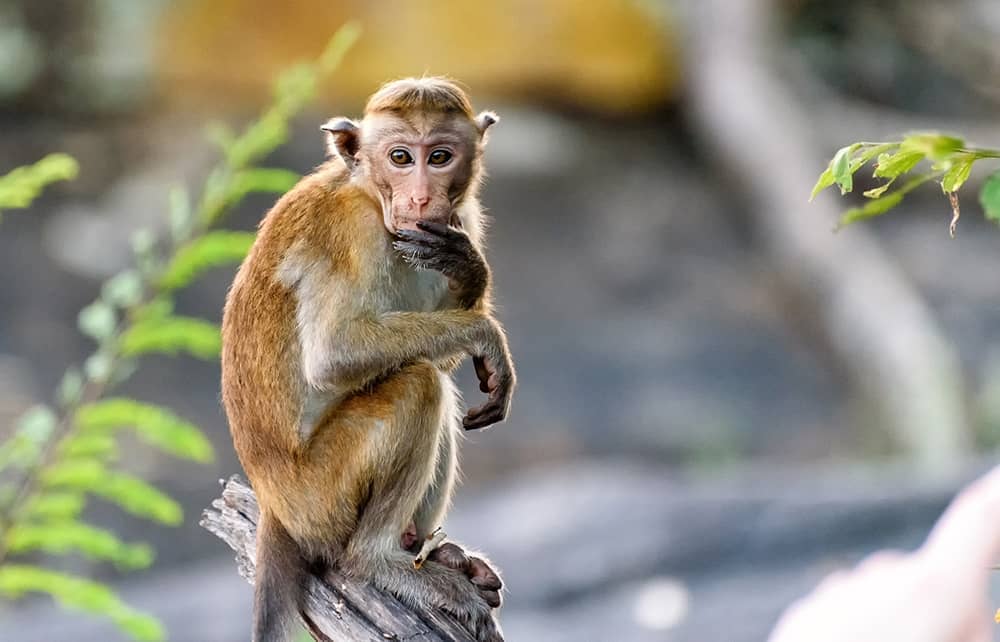I hate to be one of those columnists who says “I told you so.” But I told you so. Looking back this week through the vast underground vaults at Spectator HQ I see that centuries ago in April 2020 I explained the problem with us humans as a species. As I said back then, someone always shags a monkey. There are almost eight billion of us on this planet today, and the likelihood that we’re all going to make judicious decisions all the time is vanishingly small. The mating decisions of the species alone are notoriously prone to trial and error. And the entire future of our species rides perpetually along this cliff edge.
Last month I read in the Indian press of four men arrested by police in the western Indian state of Maharashtra. Their crime? Going on footage collected from their cell phones, the men, in their thirties and forties, stand accused of gang-raping, killing, cooking and eating a rare monitor lizard in one of India’s most protected nature reserves.
I found the headline on this article to be of the kind that draws you in. So I read on. At one stage I learned from the forest officer Vishal Mali that the four culprits seemed to have committed their crime for fun. There was, we were reassured, “no religious or black magic agenda.” On balance, I think it would have been more comforting if there had been. If the men had been acting under the delusion that raping a monitor lizard would give them better teeth or larger penises then at least we could have put it down to one of those superstitions that can be argued out of our species over the course of centuries. But these men did it for pleasure. What are the survival chances of a species that does such things, I wonder.
We have only just begun to come out of the wretched Covid era, and the world still seems none the wiser over whether the cause of that two-year-long misery was a bat-eating Chinese man or a perfectly innocent leak from a top-secret bioweapons lab. Who is to say? And now along comes monkeypox.
At present there is already a familiar culture war over the origins of this apparently species-leaping virus, for the recent European outbreaks appear to have occurred in insufficiently diverse spaces. Specifically, they have arisen at a pride event in Gran Canaria and a gay sauna in Madrid. Although nobody seems certain over whether the pox is sexually transmitted, it does seem that close proximity to other people in a crowded environment may be a factor of some kind. The government agency that tracks these things already says that the dominant groups affected so far are gay and bisexual men.
Of course no sooner are these facts brought to light than the backlash begins. So far as I know, no one has yet suggested that we round up all the Spanish gays and put them in a detention facility until the virus is contained. Our age specializes in the opposite type of backlash: the “outrage at a lack of inclusivity” backlash. So various celebrity physicians, WHO officials and others are already out of the starting blocks insisting that the monkeypox “is not a gay disease.” One Yale epidemiologist said this week: “The answer isn’t [to] shut down all these parties, tell gay men to stop having sex at them or dancing in close proximity to each other.”
To which one might say: “Well no, that isn’t necessarily the answer. But it may be a good idea to tell gay men in the Madrid area that they ought to lay off the circuit parties a bit until we’ve worked out what is going on.” Surely it should be possible to talk about public health without fearing cries of “homophobia” or accusations of “shaming.”
But nothing is that simple these days. A study into a 2017 outbreak of monkeypox in Nigeria said that it could be sexually transmitted. So maybe we are here again, as we were with AIDS, though hopefully with a far less serious virus. Still, there will be the same problem now as there was in the 1980s, a fear of identifying any particular at-risk group due to worries that if said group are identified as being especially at risk then the public will instantly turn on them. There may be some societies where that could be the case, but I should like to think that in societies like ours we might be honest about the spread of a virus and able to avoid pogroms.
Yet as with the origins of Covid, it seems we cannot be trusted with the facts. The Chinese wet-market theory was fed to us for months because it was strangely less embarrassing than the biolab theory. And if you remember back to those early Covid days, left-wing politicians were trying to encourage us to all hug a Chinese person to overcome the stigma of what was coming out of Wuhan. I don’t know if we are going to be encouraged to hug people who have just emerged from the saunas of Madrid, but I would like to think we might have a more judicious approach this time.
Who knows? There are already claims that the monkeypox came from the same Wuhan lab as Covid, in which case I would suggest that we unilaterally nuke the place. Other people claim that the pox may have come from one of those carnal relations of the kind outlined at the beginning of this piece, in which case someone in Madrid has some explaining to do. Either way, it would be nice if we could be trusted with the facts, because it looks like viruses like this are going to keep happening. Which itself gives rise to a sad thought.
When I was growing up we saw the future as one of ever greater connectivity and ever wider travel. Today that seems as hopelessly off-track as the contents of Tomorrow’s World. For while the interconnected world has its advantages, it also makes us all a few plane rides away from whatever carnality our species is capable of. This vast open world turns out to be claustrophobic too.
This article was originally published in The Spectator’s UK magazine. Subscribe to the World edition here.


















